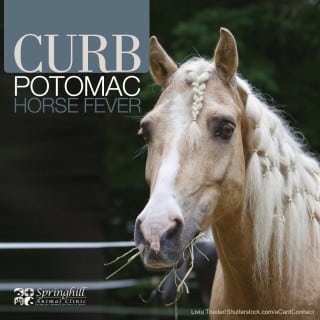Tetanus, sometimes called lockjaw, is caused by bacterial toxins that typically enter the body through wounds, especially dirty wounds. Horses are particularly susceptible to tetanus because of their environment which often contains soil and manure, as well as their tendency toward injuries. Even something as minor as a light scrape of the skin when rolling about in the pasture or rubbing against a fence can introduce bacteria into your horse’s system. When tetanus takes hold of an unvaccinated body, it attacks the nervous system, ultimately making its way to the spinal cord. The horse is likely to experience muscular stiffness and spasm, have trouble eating, and be very affected by stimulation such as loud sounds or bright light, which trigger additional spasms. Tetanus is often fatal. There are drug treatments that can be administered depending on the stage of the horse’s condition, but even in horses who are treated, just 50% or fewer survive, and those who do often have a long recovery time.
Fortunately, the awful effects of tetanus aren’t too common since most horse parents have come to realize the importance of regular preventive vaccinations. By keeping your steed on a regular wellness and vaccination plan, the chances of her acquiring tetanus are minimal.



